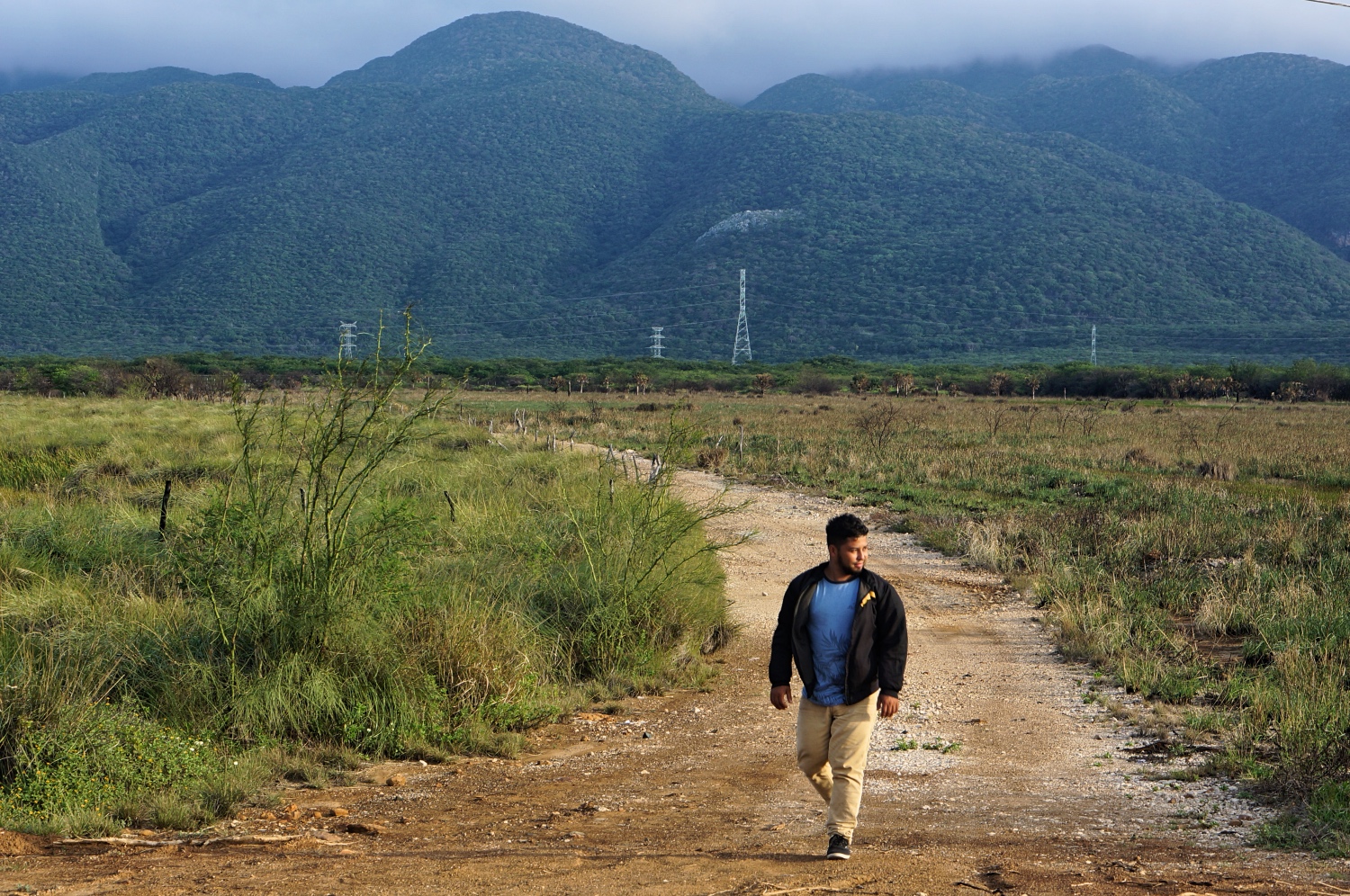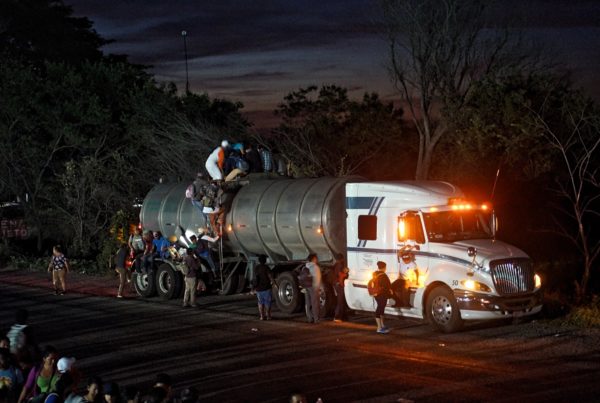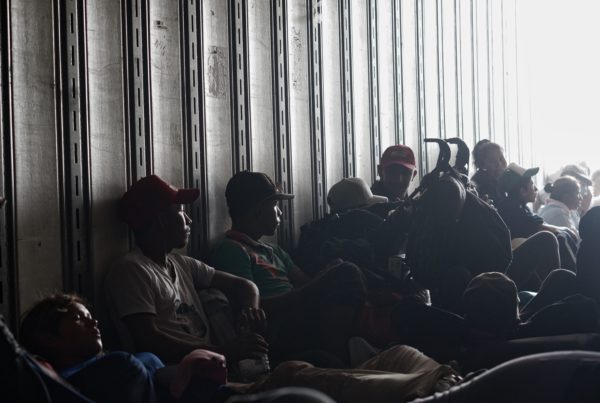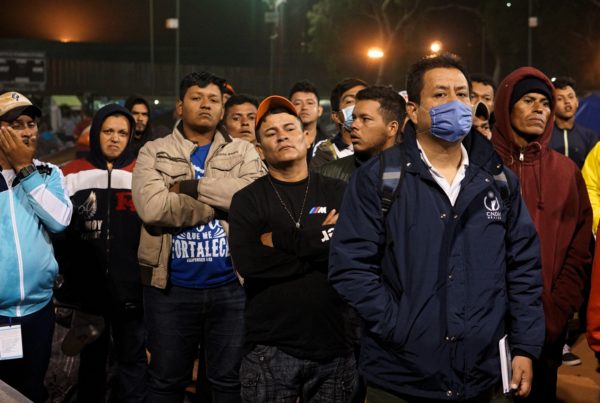Antonio is a short 27-year-old, with a chin strap beard. He calls himself “gordito” which is an affectionate way of saying little fatty. Antonio is one of the first people I met in the caravan. I followed his travels from Santiago Niltepec, Oaxaca until he arrived in Tijuana. I am still in contact with him.
He is from a small suburb called Ciudad España in Tegucigalpa, the capital of Honduras. The suburb was originally an emergency camp set up for victims of Hurricane Mitch like his parents. Foreign aid from Spain helped with housing development. That’s how his mum got her house, and that’s why the suburb is called City of Spain.
His mum works as a cleaning lady at a school and his dad can’t work anymore after he was kidnapped and tortured. He was burned inside the bus that he used to drive. He survived with scars all over his face and his hands, but he can no longer move very well because his tendons were all burned.
“My dad does look a bit ugly now, all burned up, but thank God he’s still alive and I can still hug him.”
Antonio has 5 siblings: one older brother; the rest younger than him. They are all at an age where they can work which means his responsibility lies with his parents. In Honduras there is no pension plan and his mum is already 65 years old and won’t be able to work for much longer.
“That’s why I came here. If God wills it and everything goes well, this year I will enter the United States. I can get a job and I will be able to help her out.”
Antonio is an electrician, but in Honduras he couldn’t find work and he relied on his mother’s income.
“We call our current president [Juan Orlando Hernandez] Stealing John. Everyone says that his family is involved with the drug cartels.”
Antonio says there is nothing worse than being young in Honduras.
“We live in a constant state of fear. Everyone is scared. When a police car passes by you hide because it could be the death squad or corrupt police. Young people like me in Honduras we always think about death. How are we going to die? Who is going to kill us? When is my time?”
Almost all of Antonio’s friends from school have been killed. Some of his friends became involved in the gangs and their bodies were found cut into little pieces, bagged in a sack and thrown onto the street.
“Thank God I’m still here. I want to grow old but it’s not easy in Honduras. That’s why I’m looking for a better life.”
He has been with his partner Tina for 3 months. They were friends for 6 years before they became lovers.
“Tina is a gift from God. Tina is the most amazing thing that has happened to me in all my life. There have been a lot of women but I think Tina is the last one you know? I think I have found my other half.”
Antonio and Tina didn’t join the caravan until the town of Arriaga in Chiapas, Mexico. They couldn’t leave Honduras until they had raised enough money to make the trip.
It hasn’t been an easy journey. There have been disagreements within the caravan, but Antonio attributes these arguments to hunger and fatigue. Sometimes they were able to catch a lift with buses or trucks but they have walked most of the way.
“Thank God for the Mexican people who have fed us, clothed us and cared for us when we were sick. We are very grateful.”
While on the road, Antonio and Tina met a group of other Hondurans and they now travel in a group. Antonio calls Pedro and Vincent his “brothers” and Vincent’s one-year-old his “niece”.
He thinks people join the caravan because they feel protected by the human rights organisations who march with them. That’s why people took the opportunity to travel with women and children.
Antonio’s mother didn’t want him to make the journey.
“When I said goodbye to her and told her I was leaving, she started to cry like a toddler and that really hurt my heart. It broke in half.”
Antonio answers a call from his mother. She is praying for her son that everything goes well, but she is crying with fear for her child.
“We are all scared of what’s ahead,” Antonio says. “But if you don’t learn to face your fears you will never beat them. You will always be paralyzed. My family has always told me there are two types of faith: one’s alive and one’s dead. I am here, risking my life, and that is an alive faith. I know that God will look over me as he has been doing up to now.”
Antonio wants to work in the United States, but he wants to learn English first so he can have better job opportunities. He wants to return to Honduras with money and run a motel. He’ll use the profits to help his family pay off their debt.
He believes the United States is the land of opportunity and law. In Honduras, the only people with opportunities are people who work in the government and their families.
“I believe that in this world there are good people and bad people, no matter where you are. But there is racism in the United States against Latino migrants because we are viewed as cheap labor.”
Even so, he is prepared to live with racism and oppression to achieve his dreams.
“I have endured the cold, I have endured hunger but my health is good. I’m still strong and that’s what matters.”



